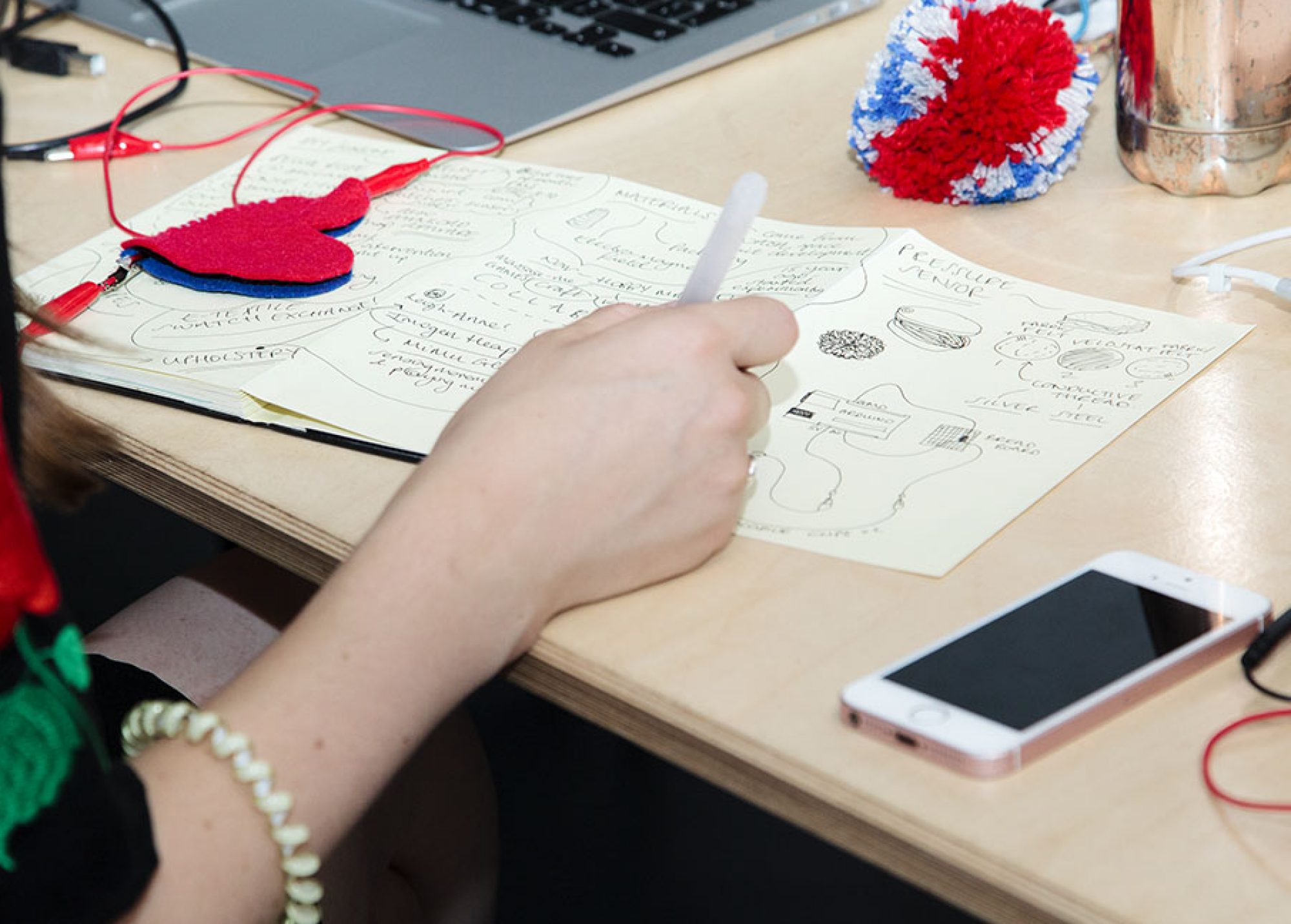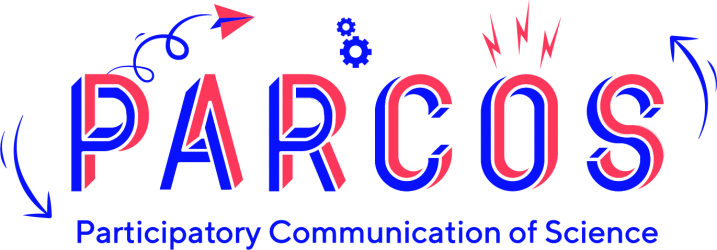ParCos is exploring creative and inclusive approaches to science communication and ways to support people in sharing their own science stories. Accuracy and clarity are important in both effective communication and honest science, so in the spirit of these principles we have produced a glossary to explain what we mean by specific words and phrases that are often used within ParCos. The glossary is the result of a workshop with ParCos project partners, who are active in different sectors and contributed based on their respective contexts. We recognise that others may define and use these words differently, but hope that this glossary can be useful in revisiting the meaning and impact of this specific terminology.
Science
Science is the application of a systematic and transparent approach to evidence. It concerns both theory and practice.
Science communication
Science communication can involve science storytellers, intermediaries, practitioners and other members of the general public between groups or peer-to-peer. Science communication refers to the use of appropriate skills, media, activities and dialogue to produce one or more personal responses, namely: awareness, enjoyment, interest, opinions and understanding (Burns et al., 2003).
Citizen science
Citizen science is science activity at least partly executed by people who do not have the professional title of ‘scientist’, but who do often work in collaboration with scientists in organizations.
People
We use the term ‘people’ to refer to all people or everybody, when it is not relevant to distinguish between different roles that people might take in a specific context.
Mainly, we will use ‘people’ instead of the general public’ or ‘the public’. Although ‘public’ is a widely-used term, its meaning changes depending on the context it is used in and other terms it is compared to. For example, ‘the public’ can be interpreted to mean non-scientists in the phrase ‘scientists engaged with the public’ but to mean non-politicians in the phrase ‘the political candidates requested feedback from the public’. Therefore, it is not always clear who is and who is not a member of ‘the public’.
Citizens and Residents
These terms are similar and you may see both used in ParCos. Both ‘citizens’ and ‘residents’ are used to refer to people in a local context, who live in a particular place. For example: ‘citizens of Bristol’ and ‘residents of Bristol’. The term ‘citizens’ will often be used in an academic context when discussing citizen science. ‘Residents’ will be used in more informal contexts, often referring to people who live in a particular neighborhood, community or city. Citizen is an established technical term (as part of citizen science) and is a wider term than people with citizenship, denoting all people who live in the region.
Participants
The term ‘participants’ is used to refer to people who take part in an activity, for example in a workshop or a project. The term has an additional meaning in some academic contexts, such as research papers or ethics applications, where it describes people who have given their consent to take part in formal research.
A term similar to ‘participants’ is ‘actors’, which may be used in an academic context to refer to people or things that are active within a project or context or have influence in some way. For example: ‘actors involved in the air quality research included scientists, parents and environmental campaigners.’ Some partners within ParCos may use the term depending on their geographical context. For example, ‘actors’ is widely understood to mean people in the theatrical or acting profession in the UK, so it may not be used by UK partners.
Participation/participatory
To ParCos, participation means actively taking part in something that is happening, for example a project or activity. This could be to represent yourself, a group, or another’s views and contributions. A participatory process contains opportunities for people to be involved as active participants. It often aims to achieve a shared goal by considering a diversity of views and contributions for the benefit of all who participate and of a society more broadly.
Arnstein (1969) distinguishes different degrees of participation, namely: nonparticipation (manipulation, therapy), degrees of tokanism (consulation, placation) and citizen power (partnership, delegated power, citizen control). When we refer to actively taking part we refer to forms such as citizen power, in which participants have control to influence the process and outcomes.
Engagement
We define engagement as the process of someone becoming aware of a particular topic, service, digital tool, project or other initiative, and interacting with it, or the people working on it, in some way. However, engaging with something does not necessarily imply active participation.
Co-design
Co-design refers to the process of working with the people who will use something (for example a product, service or project) to devise and design it, to ensure the result meets their needs and expectations.
Co-creation
We define co-creation as a collaborative process, in which people who will use something (for example a product, service or project) are part of the creative process to ensure the result meets their needs and expectations. Co-creation does not restrict participation to a specific phase, such as devising ideas or design.
Inclusive/inclusion
To ParCos, inclusion is both the principle of valuing all people equally and the process of ensuring that everyone is able to take part in something, for example sharing their thoughts, ideas, and perspectives. Inclusive environments and processes are designed to be welcoming and accessible (see our definition of ‘accessible’ below), where differences – such as gender, race, ability, religion or belief, and educational background – are respected and people are treated as equals.
Accessible
Being accessible means ensuring that all people can easily access, navigate and interact with places, products, services and activities. A key aspect of accessibility is ensuring that disabled people and people living with impairments are not excluded.
Diversity
Diversity refers to the representation and participation of a wide variety of people, who have different backgrounds, characteristics, and experiences. It can also refer to representation of a wide range of perspectives and ways of thinking. ‘Diversity’ is often used alongside ‘inclusion’.
Empowerment
Empowerment is the process of someone becoming more confident and/or able to act. It may involve an increase in power or influence. Individual, societal and political factors can influence empowerment. For example, if regional governments provide information on their decision-making process, people are more informed and could feel more empowered to weigh in.
Within the ParCos project we view empowerment as inclusion and improvement (a higher quality of opportunities). This impact of this empowerment can be situated at different levels: the individual, community, and/or organisational levels (Zimmerman, 2000).
Digital citizenship
Digital citizenship includes a variety of skills that are needed to participate socially, ethically, educationally, politially and economically in an evolving digital world (Cortesi, Hasse, Lombana, Kim, and Gasser, 2020). We define ‘digital citizenship’ as the process of people using digital technologies and tools to interact with others and go about our daily lives. It is often linked to a set of expectations, rights, responsibilities and norms that influence people in their digital interactions and the extent to which they feel empowered in the digital world.
Sources:
Cortesi, Sandra & Hasse, Alexa & Lombana, Andres & Kim, Sonia & Gasser, Urs. (2020). Youth and Digital Citizenship+ (Plus): Understanding Skills for a Digital World. SSRN Electronic Journal. 10.2139/ssrn.3557518.
Sherry R. Arnstein (1969) A Ladder Of Citizen Participation, Journal of the American Institute of Planners, 35:4, 216-224, DOI: 10.1080/01944366908977225
Zimmerman, B. J. (2000). Attaining self-regulation: A social cognitive perspective. In M. Boekaerts, P. R. Pintrich, & M. Zeidner (Eds.), Handbook of self-regulation (pp. 13–39). Academic Press. https://doi.org/10.1016/B978-012109890-2/50031-7

